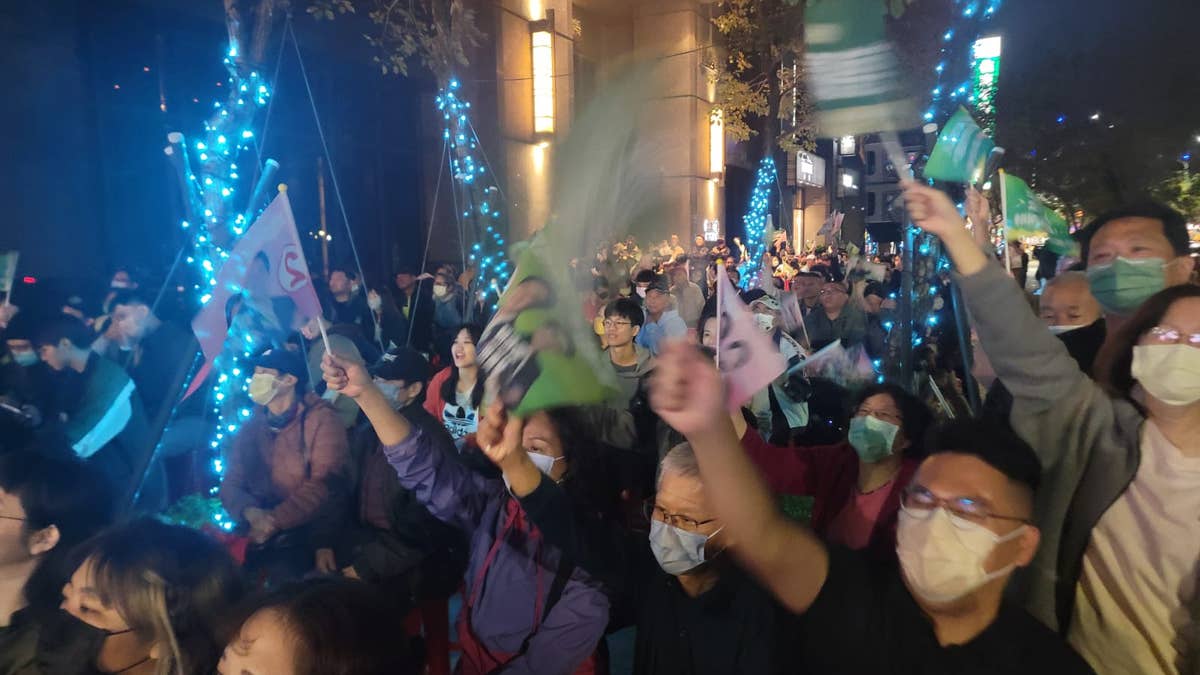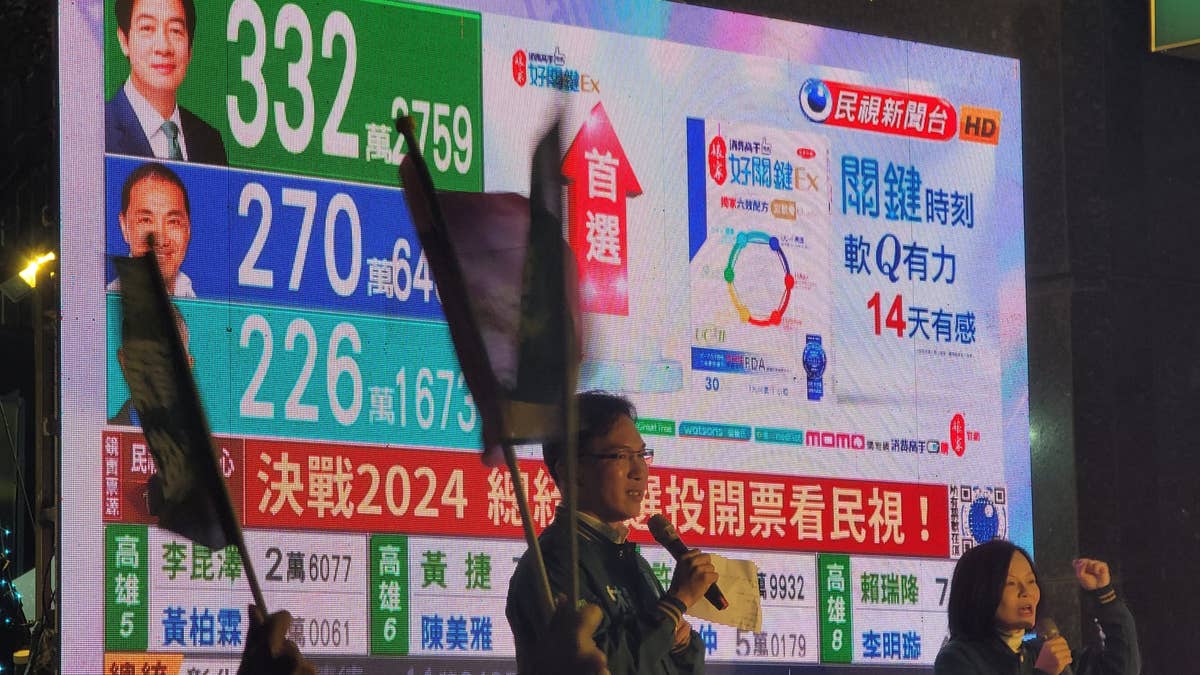Gordon Chang discusses Taiwan election
Gatestone Institute Senior Fellow and China expert Gordon Chang discusses with Fox News Digital the ramifications of the Taiwan election on U.S. and China relations.
Taiwan’s ruling Democratic Progressive Party (DPP) candidate William Lai, also known by his Chinese name of Ching-te, has emerged victorious after a tightly contested presidential election as the island’s next leader, Fox News Digital confirms.
"The results are in, and Taiwan’s voters stood up to China and all its war talk of recent weeks," Gordon Chang, Gatestone Institute senior fellow and China expert, told Fox News Digital. "Free people, living just a hundred miles from the menacing Chinese state, refused to be intimidated."
Lai, defeated his rival, New Taipei City Mayor Hou Yu-ih of the Kuomintang (KMT) party, by just over 7% of the vote after Hou conceded at 8 p.m. local time. Taiwan saw around 69% of voters turn out for the election this year. It was less than the impressive 75% in the 2020 election, which saw 13.6 million people turn out to vote, but more than the 66% that turned out for the 2016 election, according to the Taipei Times.
The victory marks DPP's third successive win over KMT for the first time since Taiwan began democratic elections over 30 years ago, the first time a party has done so. Parties had retained control no more than eight years before switching places as voter sentiment swayed between the two major parties.
CHINA THREAT LOOMS LARGE AS TAIWAN VOTES IN PIVOTAL ELECTION: 'CHOICE BETWEEN WAR AND PEACE'
"The voters broke a pattern that has held since the first democratic elections in Taiwan in 1996," Chang said. "The Democratic Progressive Party, the pro-Taiwan party and the pro-China Kuomintang Party have traded the presidency every eight years.
"Beijing insists the people of Taiwan are ‘Chinese.’ By voting for Lai, they have now loudly declared they are Taiwanese."

DPP supporters in Kaohsiung celebrate as their candidate in the presidential election takes a strong lead and the party wins the legislative race in the city over its opponents. (Eryk Michael Smith)
Fox News Digital spoke to one woman in the city of Kaohsiung who flew from California to vote in the election. The woman said she voted for Lai because his policy of making the country independent was "good for the people." She also dismissed the main opposition candidate from the KMT for being too close to China, saying it would be "dangerous" for the country.
Lai held a slim lead going into the final weeks of the election. The last polling, released more than 10 days before the vote, had him averaging five points ahead of Hou, with some polls showing them separated by just one point.
BIDEN TO SEND DELEGATION TO TAIWAN DAYS AFTER ELECTION IN MOVE LIKELY TO ANGER CHINA
Early results, however, saw Lai take a comfortable lead of around 43.27% compared to Hou's 34.01% after just about 10% of polling places had reported. The lead narrowed slightly as results continued to trickle in, but not by enough for KMT to have a realistic chance at victory.
In a press conference following his victory, Lai proclaimed, "As one of the first and most highly anticipated elections of 2024, Taiwan has achieved a victory for the community of democracies. We see today's results as having three main points of significance: First, we are telling the international community that between democracy and authoritarianism, we will stand on the side of democracy. The Republic of China, Taiwan, will continue to walk side by side with democracies all around the world.

Democratic Progressive Party presidential candidate William Lai votes in southern Taiwan's Tainan city Saturday, Jan. 13, 2024. Lai's election victory means the DPP maintains the presidency. (AP Photo/Ng Han Guan)
"Second, through our actions, the Taiwanese people have successfully resisted efforts from external forces to influence this election," Lai continued. "We trust that only the people of Taiwan have the right to choose their own president. Third, in between three groups of candidates, we received the most support, meaning the country will continue to walk on the right path forward."
Lai thanked outgoing president Tsai Ing-wen for her work over the past eight years, and he thanked his rivals for their "spirit of democracy" after revealing he had received their concession calls. He claimed he would "look forward to working together in unity for the future of our country."
Hou, joined by major KMT party figures, spoke to his supporters after 87% of the vote had been counted and it became clear that the path to victory had closed. Hou congratulated Lai and declared that all must work together for the good of Taiwan as he thanked voters for their support. Third-party TPP candidate Ko Wen-je, the former Taipei mayor, conceded shortly after Hou did.
Despite losing the presidential election, KMT picked up 14 seats to the detriment of DPP, which fell just one seat shy of having the most seats and losing its majority. The 52-seat KMT and 51-seat DPP will need to curry favor with third-party TPP, which won eight seats, to pass any legislation.

In Kaohsiung, voters watch results on large screens in Taiwan's presidential election. (Eryk Michael Smith)
Beijing did not indicate which candidate in the field it supported, but analysts identified Hou as the most likely candidate, with his party historically more friendly to the mainland. Chinese officials also went to great lengths to frame the vote as a choice between "war and peace," with Lai pitched as a separationist who would lead Taiwan to conflict.
DPP's lead in the most recent election proved the tightest win since KMT last took victory in 2012's presidential election, winning that contest by around just six points. The two successive elections saw DPP win back and retain control of the government with double-digit support.
CHINESE EXPORTS BEGIN REBOUND, BUT 2023 SLUMP STILL APPARENT
The third-party TPP's roughly 3.3 million votes are the most a third-party candidate has won since the 2000 presidential election.
In another historic first, DPP's vice-presidential candidate, former Taiwanese Representative to the United States Hsiao Bi-khim, is the first mixed-race candidate to hold the position. Hsiao's mother is American.
Heino Klinck, former deputy assistant secretary of defense for East Asia and military attaché to China, previously told Fox News Digital the election would likely play out fairly straightforwardly.
CLICK HERE TO GET THE FOX NEWS APP
Instead, Klinck warned that China would more likely retaliate during the months leading up to Lai’s inauguration with military drills and surveillance pressure to try and influence Lai’s posturing ahead of his tone-setting inaugural speech.
"Now, the world should ask itself this: Why, after this election, should the rest of us be afraid of that aggressor, Xi Jinping?" Chang argued. "It is now time for the United States to support free people who insist on governing themselves."









































